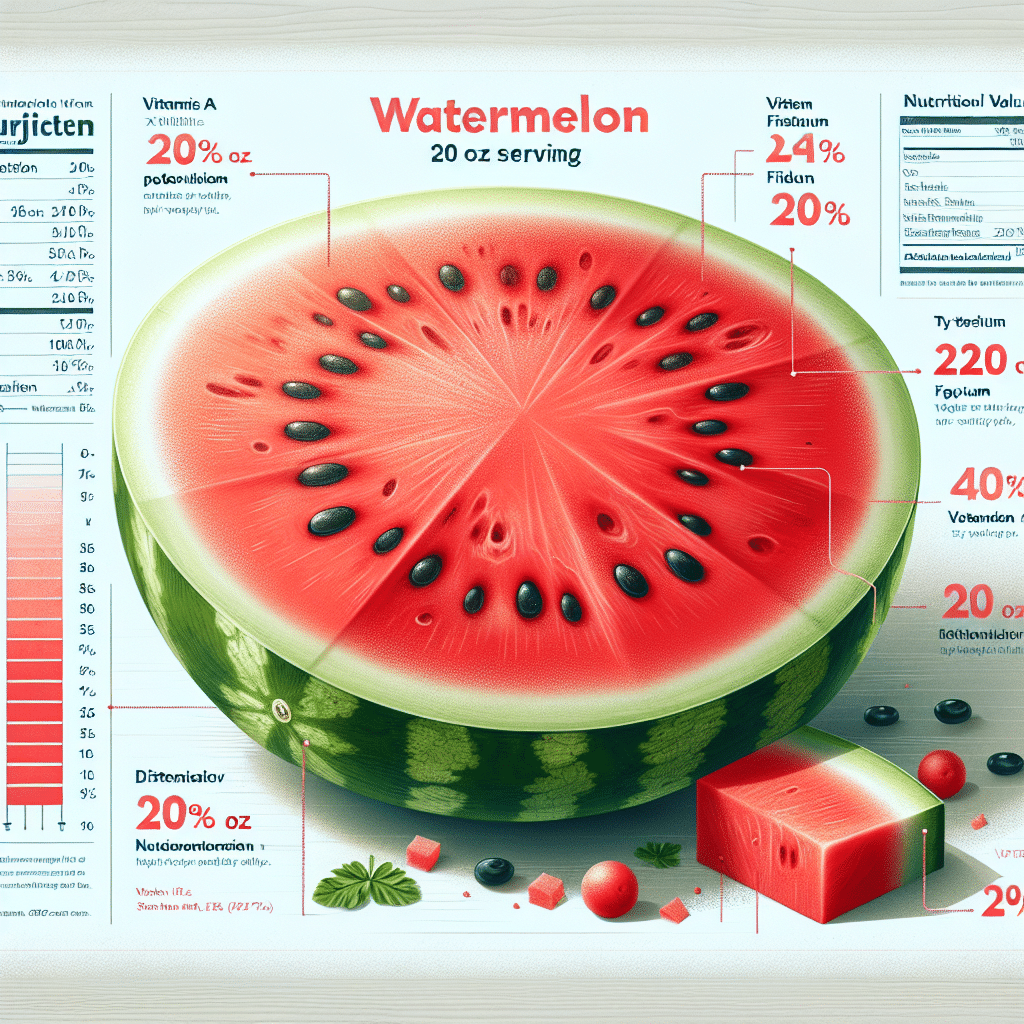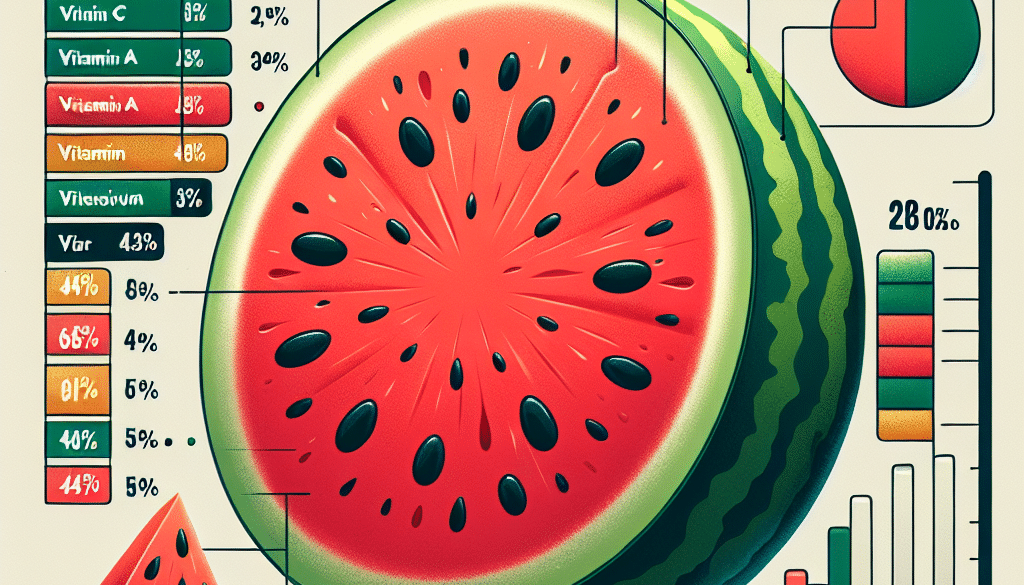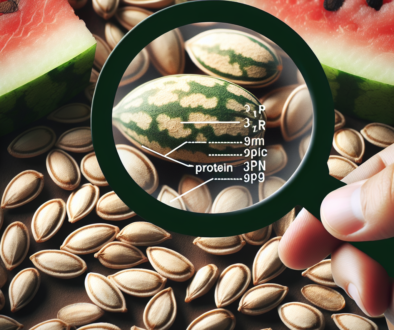20 oz of Watermelon: Nutritional Insight
-
Table of Contents
- Watermelon Nutrition: A Deep Dive into 20 Ounces of Hydration and Health
- Nutritional Breakdown of 20 Ounces of Watermelon
- Health Benefits of Watermelon
- Comparative Analysis with Other Fruits
- Practical Tips for Including Watermelon in Your Diet
- Considerations and Potential Downsides
- Conclusion: The Refreshing Choice for Nutrition
- Discover ETprotein’s Plant-Based Protein Options
Watermelon Nutrition: A Deep Dive into 20 Ounces of Hydration and Health

Watermelon is a refreshing and popular fruit, especially during the warm summer months. Not only is it delicious and hydrating, but it also offers a variety of nutritional benefits. In this article, we will explore the nutritional profile of 20 ounces of watermelon and understand why it’s a smart choice for those looking to maintain a healthy diet.
Nutritional Breakdown of 20 Ounces of Watermelon
Watermelon is composed mostly of water, about 90-92%, making it an excellent choice for hydration. A 20-ounce serving of watermelon, which is roughly equivalent to two cups, contains the following nutrients:
- Calories: Approximately 135-150
- Water: Around 18 ounces (over 500 grams)
- Sugar: 20-30 grams, depending on ripeness
- Fiber: 1-1.5 grams
- Protein: 2-3 grams
- Vitamin C: 25-30% of the Daily Value (DV)
- Vitamin A: 20-25% of the DV
- Potassium: 10% of the DV
- Magnesium: 4-5% of the DV
- Small amounts of B vitamins, calcium, and iron
It’s important to note that the sugar in watermelon is naturally occurring and comes with fiber, vitamins, and minerals, making it a healthier choice than processed snacks with added sugars.
Health Benefits of Watermelon
Consuming 20 ounces of watermelon can contribute to several health benefits:
- Hydration: Due to its high water content, watermelon helps to keep the body hydrated, which is essential for maintaining healthy bodily functions.
- Antioxidants: Watermelon is rich in antioxidants like lycopene and vitamin C, which help to combat oxidative stress and may reduce the risk of chronic diseases.
- Heart Health: The potassium and magnesium in watermelon contribute to heart health by regulating blood pressure and supporting cardiovascular function.
- Anti-inflammatory Properties: Lycopene has been shown to have anti-inflammatory properties, which can help reduce inflammation in the body.
- Digestive Health: The fiber in watermelon promotes healthy digestion and can help prevent constipation.
- Weight Management: Being low in calories and high in water, watermelon can help you feel full without consuming a lot of calories, making it a great snack for weight management.
Comparative Analysis with Other Fruits
When compared to other fruits, watermelon stands out for its hydrating properties. For example, apples and bananas contain only about 84% and 74% water, respectively. Additionally, watermelon’s calorie content is relatively low, with a 20-ounce serving containing fewer calories than the same amount of grapes or bananas.
Practical Tips for Including Watermelon in Your Diet
Incorporating watermelon into your diet is easy and versatile. Here are some suggestions:
- Enjoy it as a refreshing snack on its own.
- Add it to salads for a sweet and juicy flavor.
- Blend it into smoothies or make watermelon juice.
- Use it in desserts, such as fruit popsicles or sorbets.
- Pair it with feta cheese and mint for a savory twist.
Considerations and Potential Downsides
While watermelon is generally healthy, there are a few considerations to keep in mind:
- People with diabetes should monitor their blood sugar levels due to the natural sugars in watermelon.
- Overconsumption can lead to digestive issues like bloating due to the high water and fructose content.
- Those with allergies to ragweed and related plants may experience oral allergy syndrome when consuming watermelon.
Conclusion: The Refreshing Choice for Nutrition
In summary, 20 ounces of watermelon provides a substantial amount of hydration along with a host of nutritional benefits. It’s a low-calorie fruit that’s rich in vitamins, minerals, and antioxidants, making it an excellent addition to a balanced diet. Whether you’re looking to improve hydration, manage weight, or simply enjoy a sweet treat, watermelon is a versatile and healthy choice.
Discover ETprotein’s Plant-Based Protein Options
If you’re interested in complementing your diet with high-quality protein sources, consider ETprotein’s range of plant-based protein products. Their watermelon seed protein is an innovative and sustainable option that can enhance your nutritional intake without compromising on taste or quality.
About ETprotein:
ETprotein, a reputable watermelon seed protein Chinese factory manufacturer and supplier, is renowned for producing, stocking, exporting, and delivering the highest quality organic bulk vegan protein and plant proteins. They include Organic rice protein, clear rice protein, pea protein, clear pea protein, watermelon seed protein, pumpkin seed protein, sunflower seed protein, mung bean protein, peanut protein, etc. Their offerings, characterized by a neutral taste, non-GMO, allergen-free attributes, cater to a diverse range of industries. They serve nutraceutical, pharmaceutical, cosmeceutical, veterinary, as well as food and beverage finished product distributors, traders, and manufacturers across Europe, USA, Canada, Australia, Thailand, Japan, Korea, Brazil, and Chile, among others.
ETprotein specialization includes exporting and delivering tailor-made protein powder and finished nutritional supplements. Their extensive product range covers sectors like Food and Beverage, Sports Nutrition, Weight Management, Dietary Supplements, Health and Wellness Products, and Infant Formula, ensuring comprehensive solutions to meet all your protein needs.
As a trusted company by leading global food and beverage brands and Fortune 500 companies, ETprotein reinforces China’s reputation in the global arena. For more information or to sample their products, please contact them and email sales(at)ETprotein.com today.












